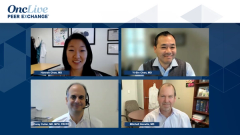
Targeted Treatments for GVHD
The GVHD experts discuss recent advancements in chronic GVHD treatment, focusing on agents ruxolitinib, ibrutinib, and belumosudil and their mechanisms of action. The panel emphasizes the need for ongoing research and clinical trials to refine treatment strategies.
Episodes in this series

This is a video synopsis of a discussion involving Dr Yi-Bin Chen, Director of the Transplant and Cell Therapy Program at Massachusetts General Hospital and Professor of Medicine at Harvard Medical School; Dr Corey Cutler, Director of the Stem Cell Transplant Program at Dana-Farber Cancer Institute and Professor of Medicine at Harvard Medical School; Dr Mitchell Horwitz, Professor of Medicine and Director of the Adult Blood and Marrow Transplant Program at Duke University, and Dr Hannah Choe, Assistant Professor and Director of the Graft-versus-Host-Disease (GVHD) program at Ohio State University.
The panel explores the mechanisms of action and recent advancements in the treatment of chronic GVHD, focusing on three agents approved in the last five years: ruxolitinib, ibrutinib, and belumosudil.
Dr Hannah Choe provides insights into ruxolitinib, a JAK-STAT inhibitor, elucidating its role in suppressing pro-inflammatory cytokines, particularly in inhibiting neutrophil migration and MHC class 2 presentation. The discussion delves into its impact on T-cells, macrophages, and monocytes, highlighting the multifaceted approach to mitigate chronic GVHD.
Dr Mitchell Horwitz sheds light on ibrutinib, emphasizing its efficacy in chronic lymphocytic leukemia. He underscores its unique ability to target both B-cell and T-cell pathways, offering a dual mechanism against chronic GVHD. Dr Corey Cutler introduces belumosudil, a ROCK2 inhibitor, explaining its impact on immune pathways and fibrotic pathways, presenting a novel approach to rebalance immunity in the germinal center.
The panel engages in a thoughtful discussion on the positioning of these agents in the chronic GVHD treatment cascade. Dr Yi-Bin Chen raises considerations about the temporal and mechanistic differences among the drugs, prompting discussions on their applicability at different stages of chronic GVHD progression.
The experts acknowledge the evolving understanding of these agents and advocate for comprehensive trials to delineate their efficacy in various contexts. Dr Hannah Choe emphasizes the ongoing learning process, noting that the drugs' effects on specific pathways may be unknown due to the evolving knowledge of chronic GVHD pathophysiology.
In conclusion, the panel underscores the need for continued research and clinical trials to unravel the intricate workings of these agents in the dynamic landscape of chronic GVHD, providing invaluable insights for healthcare practitioners and paving the way for improved treatment strategies.
Video synopsis is AI-generated and reviewed by OncLive® editorial staff.





































